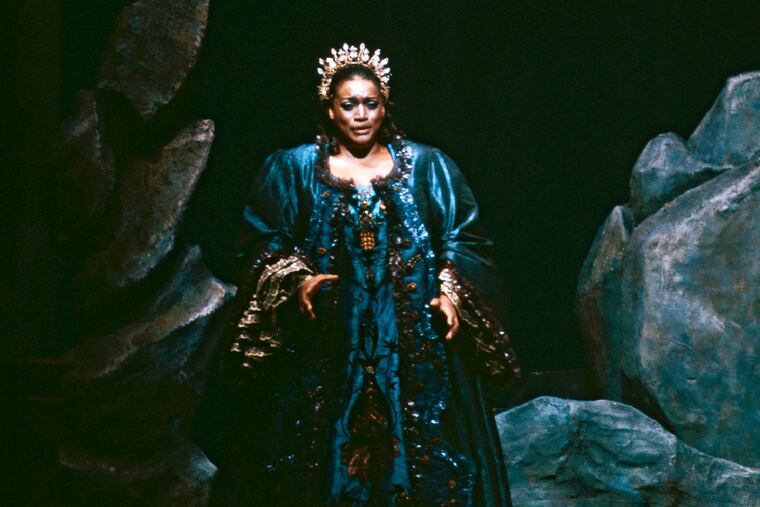Jessye Norman was a superstar globally, but Philadelphia gave her an American stage debut
The opera star's deep and emotional connections to Philly start with Marian Anderson and extend to Eric Owens. Tears of joy are involved at several junctures.

Jessye Norman, the soprano who died Monday in New York at age 74, had the most international of careers — early successes in Germany and Italy in the 1960s and ‘70s, a move to London, and major appearances in top European festivals.
But by 1982, the Augusta, Ga.-born singer still had not made her American operatic stage debut. In fact, she had taken a break from the opera stage altogether when the Opera Company of Philadelphia invited her to town.
She dove into not one but two roles, pairing Stravinsky’s Oedipus Rex and Purcell’s Dido and Aeneas. Inquirer music critic Daniel Webster called her voice “enveloping,” and the appearance drew international coverage. She made her Metropolitan Opera debut the following year.
That feeling of being enveloped, even embraced, is perhaps what her listeners fell for, too. Norman’s voice had great presence. A few years later, in 1989, she returned to Philadelphia for a song recital, again to the Academy of Music, and even in the vast space of the 2,900-seat house, it was not a heavy lift. “Her singing filled the big hall without requiring full voice, and her precision meant that the words reached the full house clearly,” Webster wrote.
Sitting in the audience for that recital was an 18-year-old Temple University voice student named Eric Owens. “It was so thrilling and enthralling to experience that voice, not only what you were feeling going through your ears, but also that you felt in your whole body the vibrations of that wonderful sound of hers," said bass-baritone Owens, now on the Metropolitan Opera roster and codirector of the opera and voice department at the Curtis Institute.
“Her last songs were a set of spirituals, and I was so moved I couldn’t help but well up at the time and even a bit thinking about it now.”
Norman — who once said she was related to “about a hundred people in West Philadelphia” — was a not-infrequent guest with the Philadelphia Orchestra, appearing first with the orchestra in 1973 in Ann Arbor, and then, over the next two decades, at the Mann Center, in Saratoga Springs, and at the Academy of Music and Carnegie Hall.
She recorded with the orchestra twice, both times with conductor Riccardo Muti, in Berlioz’s Romeo and Juliet in 1986, and in the Brahms Alto Rhapsody in 1989.
The Brahms recording is notable for matching lush with lush: Norman a reassuring blanket of sound, and the orchestra, under Muti, more lean than it had been with Eugene Ormandy, but still sounding like a series of inevitably falling velvet hammers.
Norman had remarkable breadth. You might have thought from her saturated sound that that was all she could do, as in “Im Abendrot” (At Sunset) from Strauss’ Four Last Songs. But when, in the same song, lithe, sudden moves are required, the notes snap into place with incredible precision.
Many cherish that Strauss, or her Berlioz or Ravel. For me, though, it’s her Fidelio recording with Staatskapelle Dresden that captures something beyond the written notes — the sense of liberation and triumph she and conductor Bernard Haitink found through judicious phrasing and pacing.
In a 1982 interview with The Inquirer, she herself toyed with the question of what kind of voice she had. "Am I a dramatic soprano? A lyric soprano? I have never wanted to fit in pigeonholes. Some people hear a Wagnerian voice. But I have always had a big lower voice, and people think I may be a mezzo-soprano.”
Whatever she was, she was singular — a personality, like Joan Sutherland, Luciano Pavarotti, Anna Moffo, and Dietrich Fischer-Dieskau, to name a few other giants.
“The musicianship that she had, the phrasing, the sound, the colors — you’re not going to get that again,” said Florence Quivar, who performed with Norman several times and is now an adjunct faculty member of the Academy of Vocal Arts.
“She bore her soul every time she got up in front of people,” said Owens.
Norman had another Philadelphia connection, one that formed quite early.
"At age 10, I heard, for the first time, the singing of Marian Anderson on a recording,” she told the Associated Press in 1989. “I listened, thinking this can’t just be a voice, so rich and beautiful. It was a revelation. And I wept.”